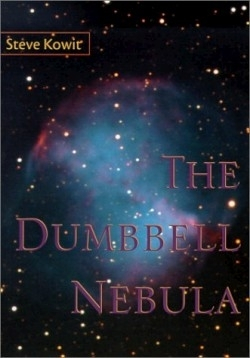
The Dumbbell Nebula
Kowit’s poems are exuberant and relentless, like the three friends (“rapturous, maniacal-high-stepping thru a blizzard of exquisite light”) who populate the poem that gives this volume its title.
The world we see in The Dumbbell Nebula is by no means sweetened or proscribed, but Kowit is a life-loving optimist: the speaker in these poems adores his wife, wouldn’t kill a garden pest much less eat beef for dinner, marches for peace and even (in a poem titled “Lurid Confessions”) is condemned by a jury for being innocent: “They have thousands of pictures of people around you, stifling yawns. As for sex - a bit of pathetic groping among the unlovely & luckless: a dance with everyone making steamy love in the dark & you alone in the corner eating a pretzel.” As here, many of the poems take a hyperbolic swing at the speaker’s own ego, with hilarious effect. In “Last Will,” for example, he directs those who survive him: “whatever you do, the mouth must remain open just as it was in life - Yes, open forever! On that I absolutely insist!”
His volubility is both his strength and, on occasion, his weakness; poems like “Mysteries” and “For My Birthday” suffer a bit from the syndrome Kowit himself lampoons in the more successful “Meet the Poet Laureate,” where a succession of earnest bores demand the speaker commemorate them in poetry. They’ve lived through impressive times of loss and survival: “As soon as they start in I’m done for, hooked,” he admits. Yet the moments Kowit fills his poems with aren’t necessarily dramatic. They’re emotionally emphatic, but everyday, friendships recalled from years ago, parents with Alzheimer’s, a rip in the crotch of a favorite pair of Levi’s, a day spent with eyes stinging from an ophthalmologist’s dilating drops. The poet seems to embrace everything, and tellingly, he sees Hell as almost identical to heaven, “Only, unlike heaven, where when it rains the people are content to let it rain, in Hell they live like we do - endlessly complaining.”
These are plain-spoken, engaging pieces by a poet whose introductory writing guide, In the Palm of Your Hand: The Poet’s Portable Workshop, and previous volumes of poetry have introduced thousands of readers to a lucid, playful, accessible style of writing.
Disclosure: This article is not an endorsement, but a review. The publisher of this book provided free copies of the book to have their book reviewed by a professional reviewer. No fee was paid by the publisher for this review. Foreword Reviews only recommends books that we love. Foreword Magazine, Inc. is disclosing this in accordance with the Federal Trade Commission’s 16 CFR, Part 255.
